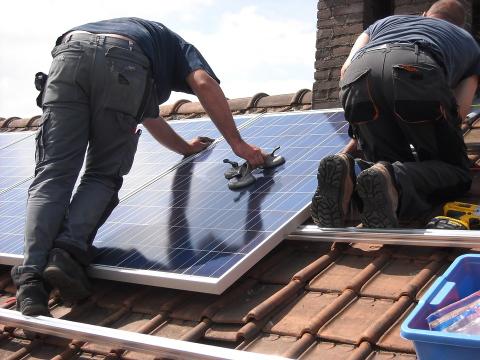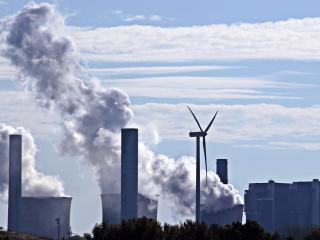Saskia Lavrijssen: Dutch climate agreement is not Europe-proof
The energy transition: an area that in legal terms needs a breath of fresh air, and could probably use a whirlwind. Tilburg Professor Saskia Lavrijssen points to some much-needed amendments to energy legislation, harmonization with competition law and European law, a statutory basis for energy-producing consumers, and – last but not least – the governance of the energy transition. Some legal remarks on moving from fossil fuels to sustainable energy.
What gives you energy?
Lavrijssen: “I enjoy the challenge of being asked to tackle a complex social problem, and of working together with different public and private parties on the future of the Netherlands and of Europe. I also enjoy educating young people and firing their enthusiasm. It’s really motivating to see students on their internship seeing, for the first time, the links between what they’ve learned in lectures and what they might later do professionally. And I’ve seen many of my students become talented professionals.”
Do you spend most of your time behind your desk?
Lavrijssen: “No, on the contrary – I have lots of contact with colleagues and social partners, such as infrastructure companies, governments and user organizations. The research being done into the energy transition and the data-driven society is very multidisciplinary; I also work with administrators and economists. My colleagues Henk Akkermans, Martijn Groenleer and Wendy van der Valk and I have been given NWO research funding for the Longavia project, which is about the data revolution and how it affects the energy transition and the transport and water sectors. New technologies are making everything smarter, and vast amounts of data are becoming available. Big data offers a great many opportunities: for example, you can predict network capacity demand and supply, and infrastructural maintenance needs, more accurately. But there’s a legal side, too: who owns the data? Who gets access rights to it? How do you share this information so that new parties can enter the market? And what are the limits of competition law?”
The energy transition is a huge, complicated puzzle that we will have to solve together
Energy community
Tilburg University is now home to an active climate and energy community that brings together scientists, including Saskia Lavrijssen, and their expertise. It is a voluntary collaboration that cuts across departments and Schools. Its principal concerns are climate change, the energy transition, and what research could contribute. This community is a good reflection of current societal developments: thinking beyond specializations to tackle an overarching theme.
Lavrijssen: “The energy transition is a theme in which a wide variety of disciplines play a role: legislation, behavior, administration and governance. All these aspects will have an effect on whether climate goals are achieved or not. This is a huge, complicated puzzle that we will have to solve together. Interdisciplinary collaboration also leads to better publications. The university must change, just as society is changing. Universities are paid for with public money, and are therefore quite rightly subject to critical scrutiny. If we do fundamental research, but never think about relevant social issues, how much do we really matter?”

What changes in energy legislation are actually needed?
The Netherlands now has a Climate Agreement and a Climate Act which define the agreements on the Dutch energy transition. These have all kinds of legal consequences. So what kind of changes are still required in energy legislation?
Lavrijssen: “Over the next few years incremental legislative proposals will be submitted to make the 1998 Electricity Act, The Gas Act, the Heat Act, the Offshore Wind Energy Act and the Mining Act ready for the transition to low-CO2 energy supply and compatible with European law. The Energy Transition Progress Act will repeal the obligation to connect new-built houses to the gas network.
“Energy legislation is still based on a traditional market model in which large coal-fired or gas-fired power stations produce energy on the basis of demand from passive consumers. New legislation will have to allow for ‘prosumers’, electricity-producing consumers, who currently play a rather limited role in energy projects. Network managers, too, who are increasingly involved in the introduction of prosumers and locally produced sustainable energy, need more instruments in order to be able to balance the supply and demand of electricity.
“The Heat Act is outdated... Hydrogen storage is still unregulated”
“Local authorities also play a leading role in the rollout of sustainable projects and in making urban districts CO2-neutral. New legislation will anchor the associated responsibilities, rights and duties. Energy storage, for instance using batteries, hydrogen and other energy carriers, is also essential to maintaining a balance between the demand and supply of heat energy. Who should be allowed to manage such storage facilities, and which responsibilities, rights and duties apply? Hydrogen is seen as a promising technology for transport fuel, energy storage, and as an industrial raw material. But the transport and storage of hydrogen is still unregulated. Heat networks are expected to play a growing role in residential district heating. But the Heat Act is outdated; the regulation of heat prices is still linked to the cost of heating a house with natural gas.”
In your view, the first principle for all of this should be ‘technology-neutral legislation’. Could you explain what this means?
Lavrijssen: “Existing regulations focus on the type of energy carrier, such as the right to be connected to the electricity grid or to the gas network. Legislators are still not looking at the functions of energy use, and there is a risk that legislation and technological development will continue to diverge. The right to be connected to an energy network remains a fundamental one, but it would be better if it were worded in a technology-neutral way. This would mean that the regulations would not be related to a given technology or energy carrier, but to energy functions: power, light, high-grade and low-grade heat, transport, and mobility.”

“ New European legislation demands that consumers have a right to generate energy for themselves"
What is still lacking in the legal position of the ‘prosumer’?
Lavrijssen: “New European legislation demands that consumers have a right to generate energy for themselves, to store energy, and to take part in Demand Response Programs. They must be allowed to trade, via an aggregator or otherwise, the energy that they do not use, for instance on digital trade platforms. The rights of sustainable energy collectives must also be regulated in the same sort of way.”
You have argued for the merging of existing laws. What would be the advantages of an integrated Energy Act?
Lavrijssen: “We currently have a Heat Act and two separate Acts, the 1998 Electricity Act and the Gas Act. The advantage of a single integrated Energy Act, in which the regulation of hydrogen and other energy carriers could be incorporated in due course, would be that it enabled a functional, technology-neutral approach, in which the first principles of the legislation would be the functionalities of the energy carriers rather than specific technologies. An integrated Energy Act would improve flexibility and legal transparency. I would expect the quality of the three separate Acts to improve, which would promote legal security and improve the functioning of the energy market. Moreover, an integrated Energy Act would deliver more consistency in the formulation of public interests such as affordability, sustainability, and supply security, the regulation of network managers and network tariffs, network access, and the protection of energy and network users.”

Is the Climate Agreement ‘Europe-proof’?
Lavrijssen: “The agreements reached were not subjected to prior scrutiny in the light of European law and international frameworks governing human rights and the environment. This should have been done before they signed. The agreements therefore have unstable foundations, with all the accompanying risks of legal procedures that threaten to delay, rather than expedite, the actual achievement of the goals. Moreover, the hundreds of European concepts and definitions that result from European network codes, and which have direct application in the Netherlands, take precedence over Dutch law. Research has shown that current Dutch definitions are not a seamless fit with the European concepts which would serve as the basis for integrated concepts in a new Energy Act 1.0. If we do not make this link, we will retain Dutch concepts and definitions that are in conflict with European definitions.”
Lavrijssen also has some critical comments on competition law and European law. For instance, collaboration between businesses intending to make homes CO2-neutral might well contravene competition law, because free competition between enterprises is then affected. And the part of the Climate Agreement stating that the government will endeavor to use only energy that is ‘renewable on Dutch soil’ by 2030 is inconsistent with the internal market definitions used in European law. At the EU level efforts are being made to implement a more Europe-wide market, for instance by increasing the number of international links for the import and export of energy, and through the agreement that member states assist one another in the event of an energy shortage. If every country were to implement that sort of clause, little might come of this sort of cooperation in practice.

The extraction of these raw materials is linked to serious risks to human rights and the environment in countries like Zambia, the Congo and China
You have spoken of the ‘human rights implications’ of the energy transition. What do you mean by that?
Lavrijssen: “The enormous demand for batteries, wind turbines and solar panels has increased demand for their raw materials, such as cobalt and copper. The extraction of these raw materials is linked to serious risks to human rights and the environment in countries like Zambia, the Congo and China. According to international frameworks of socially responsible business, the Dutch government and Dutch businesses are responsible for detecting such negative effects on people and the environment, preventing them, and tackling them in international trading chains. So far Minister Wiebes has indicated a willingness to trust to self-regulation, with companies making agreements on these risks through a covenant. I don’t consider this adequate. Respect for human rights and the environment need to be firmly established for the entire production and distribution chain in the future package of climate measures.”

Good governance in the energy transition
You have laid a strong emphasis on governance. What needs to happen?
Lavrijssen: “That’s right. The governance processes of the energy transition are at least as important as the climate agreements themselves. An effective, transparent governance structure, with clear participative processes for civilians, adequate powers for the Authority for Consumers & Markets (ACM), and the appointment of an independent Climate Commissioner, would help to prevent protracted legal procedures. We need clear agreements between the Minister, provincial and local governments on the role of network managers and social partners. Civilians need to know who to contact when things go wrong – for instance, if there is a power blackout, or the heat supply is defective.”
What role does the Authority for Consumers & Market (ACM) play in this matter?
Lavrijssen: “The ACM is an important watchdog organization which guards against unfair competition resulting from the misuse of market domination, regulates network tariffs, and enforces consumer protection laws. It needs adequate powers in order to apply more customization to the approval of connection and transport tariffs and to monitor energy supplies. And the ACM also needs to be able to do its work with sufficient independence from government. This means: sufficient autonomy in determining the right conditions and methods for establishing connection and transport tariffs and in the enforcement of energy law, consumer protection law, and competition law.”

The governance processes of the energy transition are at least as important as the climate agreements themselves
Do network managers and the ACM possess adequate legal instruments?
Lavrijssen: “No, they don’t. The legal framework offers them too few instruments for directing matters so that local production and storage installations are connected to the electricity grid in an optimal way. Network managers have no formal say in the geographic location of sustainable production installations, charging stations, or storage facilities. At the same time, existing energy legislation limits the application of financial incentives to purchasers and producers to settle in ideal locations and to use energy as efficiently as possible. A serious problem is that in several areas, network managers have insufficient capacity to connect larger sustainable production installations. This is jeopardizing the aims of the energy transition. Minister Wiebes has now announced that measures will be taken to improve the harmonization of network demand and supply capacity.”
You have argued for the appointment of a Climate Commissioner. What would be the benefit?
Lavrijssen: “A Climate Commissioner, in line with the example of the Delta Commissioner, would oversee the implementation of the goals, rules and procedures relevant to the Climate Agreement and would monitor the interactions between the various processes and regulations. Their added value would be that they operated independently of the government of the day. They could be entrusted with objective tasks that needed to be carried out whatever the political situation or political interests. Civilians and authorities could also approach the Commissioner for concrete help if there were difficulties in the development or execution of certain sustainability projects.”
Saskia Lavrijssen (Waalre, 1976) is Professor Economic Regulation and Market Governance of Network Industries at Tilburg Law School
Before that, she was Professor of Energy Law at the University of Amsterdam. In 2006 she successfully defended her PhD dissertation on independent competition law supervision and good governance at Tilburg University (Boom Juridische Uitgevers, 2006). She worked as a legal researcher in the administrative law and regulated sectors department of an international law firm. Until 2007 Saskia was a university lecturer in European Law at Tilburg University and a research coordinator for the Tilburg Law and Economics Center (TILEC). In 2010 she was awarded a prize by the Dutch Competition Law Association for the best publication on the roles played by non-competition interests in European and Dutch competition law. Thanks to her expertise in the field of competition law and economic administration law, in 2010 she was appointed as Deputy Counselor for the Board for Appeal for Business and Industry (2010–2013). She was also an expert consultant in a Dutch House of Representatives focus group during a parliamentary inquiry into housing associations.
Portrait picture: Laila Willems

In 2017 she was awarded NWO funding within the framework of the Next Generations Infrastructures Program to carry out research into the promotion of data-driven innovations in the infrastructure sectors. Saskia is regularly asked to appear as a speaker or expert; for instance, in 2019 she spoke in the Dutch House of Representatives on the legal aspects of the draft Climate Agreement. She is the founder of Oyster Legal, a legal advice bureau specialized in the areas of supervision, regulation and energy law.
Read / listen more
- Saskia Lavrijssen: website Tilburg University, incl. recent publications
- Saskia Lavrijssen: Waarborgen voor de energieconsument in de energietransitie, inaugural address Tilburg University 2016
- Saskia Lavrijssen: Wetgeving niet klaar voor energietransitie, Tilburg Research, sept. 2017
Photography: Oyster Legal (Epic), Laila Willems (2nd portrait), Amnesty, Vattenfall, Pixabay, Britannica Image Quest


